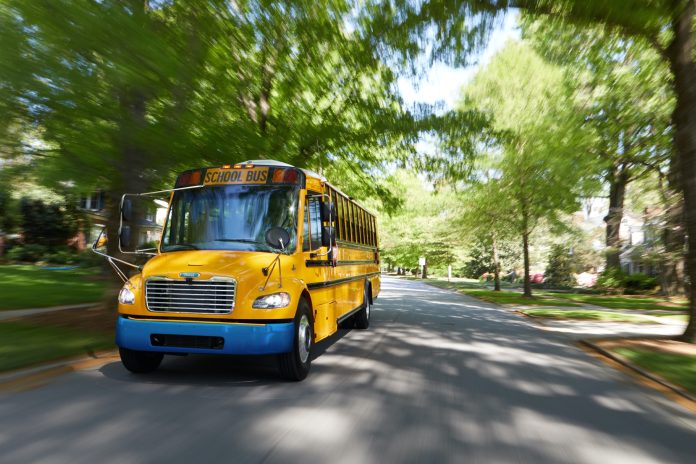There’s a lot to think about when taking your fleet electric. Things like EV safety standards, electric battery chemistry and testing. For electric school buses, the risk of a thermal incident is often top of mind for customers as well.
The Thomas Built Buses Saf-T-Liner® C2 Jouley® is an excellent example of an electric school bus that exceeds safety standards. From battery construction to training and network support, Jouley checks all the boxes in terms of bus safety and efficiency.
Here are five safety factors to consider when electrifying your fleet.
1. Battery Construction
The most common type of battery in modern electric vehicles is the lithium-ion battery. Manufacturers use different types of lithium-ion batteries to power electric school buses. Prismatic or large-form battery packs are a popular option. However, in the case of Jouley, thousands of cylindrical battery cells are used.
Jouley contains two Proterra Powered™ battery packs. Each battery pack contains more than 6,000 small, cylindrical cells. Basing a battery system on thousands of small cells adds another layer of resilience for maximum bus safety.
In the event one of those cells did fail, the failure would be contained to just that one battery cell. All other batteries would continue operating to power the bus. The batteries also have built-in safety technology that provides an even higher level of protection.
2. Battery Protection
Battery packs, by nature, are large sources of energy. It’s important to protect that energy, regardless of what the battery pack is made of or where it is located in a vehicle.
For example, Jouley’s Proterra Powered battery packs are encased in lightweight, ballistic-grade aluminum to guard against weather, impacts and other extremes.
3. Thermal Management
One of the top concerns surrounding electric vehicles is thermal incidents. While proper ventilation is important in all vehicles, EVs require even more as a result of the energy they demand and produce.
To protect against thermal incidents, Jouley school buses use Passive Propagation Resistance (PPR). In the unlikely event of an incident, PPR is designed to detect and isolate an affected battery cell while protecting neighboring cells from further propagation. PPR also allows for proper heat venting, enabling a slower, more controlled release of energy in the rare case of a thermal event.
The Battery Management System (BMS) adds another layer of protection. The BMS is like the brain of a battery pack. It keeps tabs on many factors—like voltage, temperature and humidity—and uses that data to ensure that the battery continues operating safely and efficiently.
4. Battery Testing
Battery testing is essential in identifying and developing solutions for problems before they occur, as well as ensuring the batteries meet all safety and efficiency standards of the school bus and automotive industries. A couple of electric safety standards you may hear about are SAE J2929 and ISO 26262.
- SAE J2929 is a high-level standard adopted by the automotive industry that defines acceptable safety criteria for lithium-based, rechargeable battery systems.
- ISO 26262 is a standard that ensures the integrity of monitoring and controlling software that protects the battery pack against the most critical hazards and failures.
With partners at Proterra, Thomas Built continues to push safety testing further, above the established safety standards. Proterra has also developed its own testing protocols to ensure optimal battery pack performance and safety in a range of conditions. They routinely test how batteries stand up to impact, vibration, submersion and extreme temperatures.
In addition, Proterra and Thomas Built conduct a wide variety of safety tests on Jouley to ensure electric, controls and mechanical abuse safety.
5. Training and Network Support
Moving toward a better, more sustainable future isn’t just about building electric school buses. It’s about building a network of knowledgeable, well-informed experts to keep fleets going strong and ensuring those who maintain the buses remain safe as well.
That’s why Thomas Built employees work on-site with maintenance teams and dealers to ensure that all technicians are properly trained to safely maintain Jouley. In addition to electric bus experts, Thomas Built also has a variety of service locations.
As part of Daimler Truck North America, their vast service network makes sure that the dedicated, personalized assistance you need is always close by.
Learn more about Jouley to begin your electric journey today.
















